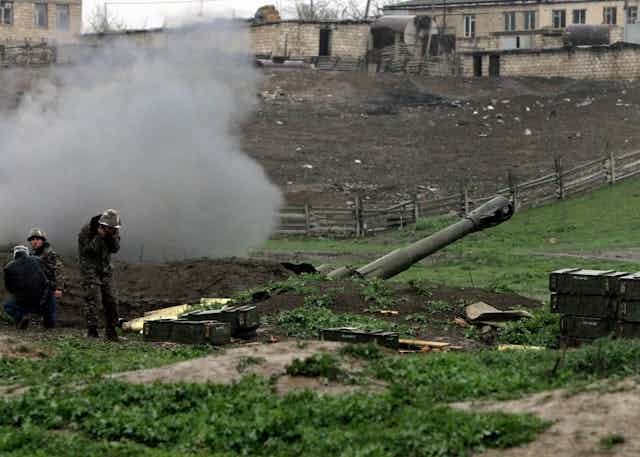Every now and then, the West is reminded of a quarrel in a far-away country between people of whom it knows nothing (as Neville Chamberlain once said). Nagorno-Karabakh is such a place, a tiny enclave that has caused strife between neighbouring Azerbaijan and Armenia even before they gained independence from the Soviet Union.
While recognised as part of Azerbaijan by the international community, the ethnic Armenians living in the Nagorno-Karabakh region fought an independence war to a standstill in 1994. It is now essentially an independent republic supported by Armenia, and while the fragile truce that has held from 1994 on has been regularly breached, the latest bout of fighting is the most serious escalation of violence to date.
Recent political developments have made the opportunity to calm hostilities more difficult than in the past. In the absence of any democratic legitimacy in either country, those in power have turned Nagorno-Karabakh into the centrepiece of incompatible and entirely uncompromising nationalist narratives.
Armenia’s leadership lives and dies by its ability to hold on to the territory, and so has a clear interest in maintaining the status quo. Azerbaijan’s government on the other hand, under pressure to “liberate” the region, has become disillusioned with the deadlocked negotiations, and the recent fall in oil prices has hit Azerbaijan’s economy hard. With President Ilham Aliyev’s regime’s stability based on oil revenues, stoking nationalist sentiment is a likely means to compensate. Combined with Armenia’s recent more assertive military posture, there is already great potential for further escalation.
Worse, the situation has moved on since the first Karabakh war up until 1994. While this is still the bloodiest post-Soviet inter-state conflict with its estimated 30,000 deaths, the forces in the South Caucasus are no longer simply hastily assembled groups of Armenian and Azerbaijani militiamen. Both sides have poured billions into their militaries, with oil-rich Azerbaijan in particular acquiring high-tech weaponry. Both sides are now armed to their teeth with up-to-date weapons systems capable of targeting infrastructure and cities far from the frontlines: both Baku and Yerevan can be reached by the belligerents’ ballistic missiles.

The consequences of escalation for the region would be far more wide-ranging than seen in the past. Now, there are contradicting and rigid interests and alliances that are much more dangerous than in the 1990s, when the Caucasus was still a largely isolated, post-Soviet backwater. Today the European Union sees the “Southern Gas Corridor” and the Baku-Tbilisi-Ceyhan oil pipeline as vital for its energy security. With the latter an obvious target in the event of a prolonged Karabakh war, both existing and prospective energy transportation routes would be severely disrupted. EU ally Georgia would also be faced with near-impossible choices, squeezed between strategic partnerships with the EU and Azerbaijan, its hitherto friendly relations with Armenia, and the latter’s alliance with Russia.
More worryingly, today great powers and regional players such as Russia and Turkey could be drawn into the conflict through their relations with Armenia or Azerbaijan. The Collective Security Treaty Organisation could see its first serious test of credibility in the event that war spills over beyond Karabakh into Armenian territory. Moscow would be faced with an unpalatable choice between having the credibility of its alliance commitments weakened into irrelevance, or having to intervene directly. Turkey might find itself entering the fray if hostilities spread to the Azerbaijani exclave of Nakhichevan, separated from Azerbaijan by Armenia and sharing a short border with Turkey, where clashes in 1992 led to a sharp war of words between Moscow and Ankara.
It might all still seem very unlikely at this stage, but the political elements are falling into place that could see the Nagorno-Karabakh conflict quickly grow from a geopolitical sideshow to a major regional problem. Seen through the lens of the conflict in Ukraine and Russia’s annexation of Crimea, the concerted effort required for a diplomatic solution now looks more implausible than ever. Armenia’s president has already threatened to recognise the enclave’s independence in case of further escalation, while Azerbaijan has raised the spectre of all-out war in response to “continued provocations”.
The South Caucasus could be the next breakdown in European security that has held since the Cold War, adding yet another element of instability to the growing disorder of today.

